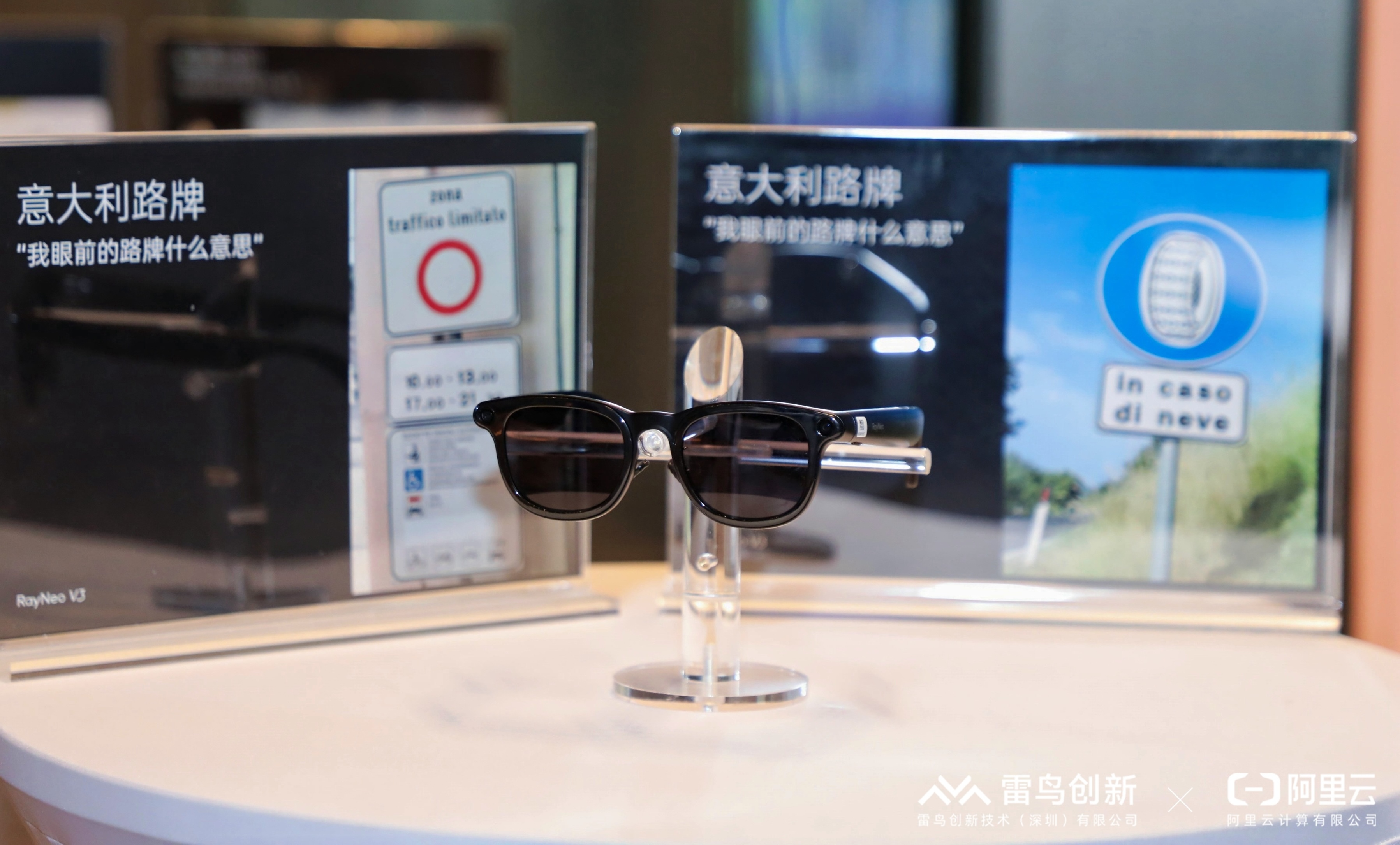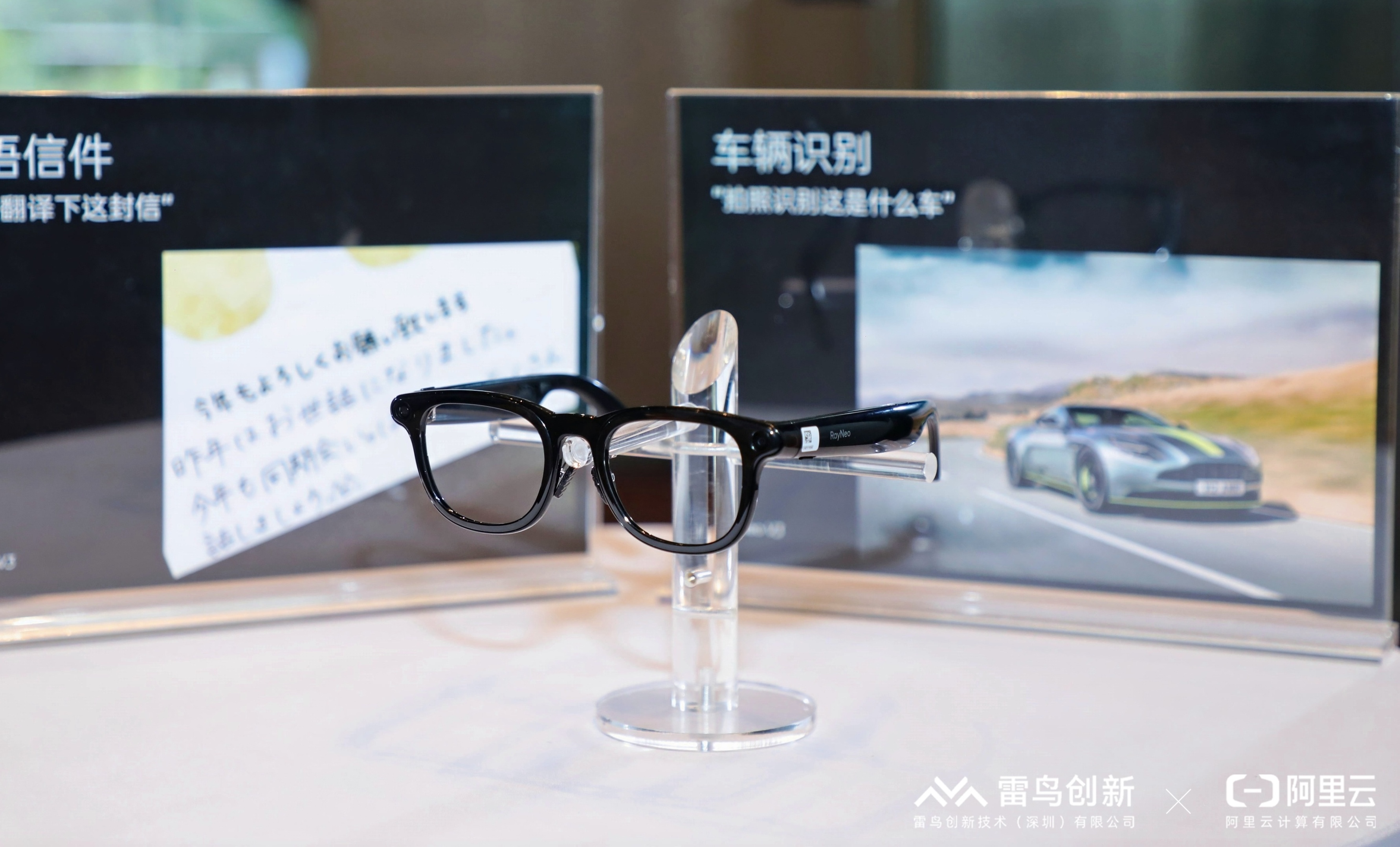AI+AR Glasses War Heats Up: Alibaba Joins the Fray!
![]() 01/03 2025
01/03 2025
![]() 671
671
In the age of AI, various scenarios are being reconstructed.
By 2024, 'wearable devices' have emerged as the prime platform for implementing AI on mobile devices. Among these, AI glasses have garnered significant attention. With Ray-Ban Meta validating the feasibility of AI glasses, tech giants like Apple, Google, and Samsung have also ventured into this domain. Domestically, Xiaomi, Huawei, Meizu, and other manufacturers have followed suit.
The industry has aptly dubbed this AI glasses boom the 'Hundred Glasses War'.
At the heart of this war lies the large AI model, which is the cornerstone of competition among manufacturers. Lei Hongwei, founder and CEO of Raybird Innovation, once stated that AR glasses will serve as an external brain for humans, and AI will accelerate its evolution. The fusion of AI and AR glasses heralds the digitization of the world.
With the support of large AI models, the AR glasses industry stands at a pivotal juncture, and the Hundred Glasses War is imminent.
Alibaba's entry into this fray signifies a shift towards differentiated competition in the AI glasses market.
As market competition intensifies and AI technology advances, the AI glasses industry is poised to enter a new phase of differentiated competition.
Currently, most glasses brands often utilize open-source or basic models when integrating AI, neglecting optimization for the unique usage scenarios of glasses. This results in AI smart glasses failing to deliver the desired experience, with product functions and scenarios becoming highly homogeneous, making it challenging for players to establish a competitive edge.
Against this backdrop, deeply customizing AI models for glasses scenarios has emerged as a core competency for AI glasses players.
On January 2, Raybird Innovation and Alibaba Cloud held a strategic signing ceremony, announcing a deep strategic partnership in the realm of AI glasses. The Tongyi series of large models will provide exclusive, customized technical support for Raybird Innovation's AI glasses.

This marks the first in-depth, customized collaboration between a large model manufacturer and a glasses product in China. Tongyi Qianwen, a subsidiary of Alibaba Cloud, will provide exclusive, customized large model technical support for Raybird Innovation's AI glasses. Simultaneously, this is Alibaba Cloud's first strategic-level cooperation in the AI glasses sector.
Perhaps many are still unclear about the significance of an exclusively customized large model for AI glasses.
The primary distinction between a general large model and a customized model lies in their performance in specific device applications. While a general large model covers a broader range of fields, it often underperforms compared to a customized AI model in specific applications. Conversely, a glasses-tailored AI model better understands and responds to user needs and operations. The most noticeable improvements include faster feedback, reduced misjudgment rates, and enhanced response quality, making AI more suitable as a hardware carrier in glasses and a truly portable intelligent tool for users.
For instance, any car can navigate the Sichuan-Tibet highway, but an off-road vehicle offers a superior experience due to its customization for mountain roads. Each has its area of expertise.
The collaboration between Raybird Innovation and Alibaba aims to optimize for the unique usage scenarios of glasses. Taking speed as an example, Raybird Innovation and the Alibaba team, leveraging the Tongyi series of large models, have constructed a large model application system tailored for glasses. This system comprises multiple models, supports multimodal interaction, and integrates cloud and terminal functionalities. It is an architectural framework specifically designed for glasses scenarios. Through technical optimization, each user task request is routed to the most suitable model for processing, thereby enhancing AI response speed. Additionally, both parties have made substantial optimizations focused on 'speed.' Solely in the 'request' distribution link, various model optimization techniques have been employed to keep the task distribution time within 0.2 seconds.

According to staff, the Raybird V3, equipped with this customized model, boasts an average response speed of 1.3 seconds, outperforming Ray-Ban Meta in multiple capability comparisons.
Furthermore, this customized large model embodies characteristics such as high accuracy, stability, multi-scenario applicability, and continuous updating and iteration. It is revealed that the Raybird V3 achieves a response accuracy rate of up to 98%, making it a versatile, encyclopedic assistant. In terms of scenarios, the two parties will also explore innovative AI scenarios like AI translation, music radio, cocktail mixing, chess playing, and more, rendering AI glasses not only smart but also more practical and engaging.

(Demonstration of Raybird V3's cocktail mixing function)
The partnership between Raybird Innovation and Alibaba is a mutually beneficial endeavor. With its robust large model foundation, Alibaba meets Raybird smart glasses' deployment needs for large AI models on cloud and terminal platforms, compensating for the general lack of AI capabilities in the current glasses industry. Conversely, Raybird brings user scenarios to Alibaba, helping Alibaba AI reach more AI+AR core users and bolstering Alibaba's AI hardware deployment strategy.
Amazon Leads the Way: AI Glasses Become a Productive Force
Coincidentally, another e-commerce giant across the ocean, Amazon, also recognizes the potential of AI+AR glasses.
On November 12, Reuters reported that Amazon is developing AR smart glasses for delivery personnel, providing route guidance through digital graphics directly overlaid on the field of view, thereby accelerating last-mile delivery efficiency.
Shortly after, an Amazon employee was spotted wearing AR glasses during a delivery. Upon communication, it was revealed that they were the yet-to-be-released Raybird X3 Pro. Supported by Raybird X3 Pro, couriers can complete the entire service chain from order dispatch, location navigation, customer contact, to delivery completion, freeing their hands while significantly enhancing delivery efficiency and accuracy.

The Raybird X3 Pro is a new AR glasses product scheduled for official launch by Raybird in 2025. Since its debut in early 2024, the product has undergone multiple iterations and garnered significant media attention. According to Lei Hongwei, the X3 Pro adopts a novel AR optical design, increasing product display brightness to 2500 nits and overcoming the rainbow effect issue, ensuring full-color, high-brightness, and transparent display across all scenarios. Beyond focusing on AR display, the X3 Pro is equipped with the Qualcomm Snapdragon AR1, high-precision cameras, and Tongyi customized large models, unleashing the full potential of AI+AR glasses' hardware and software configuration.
In fact, Amazon is not the first e-commerce giant to utilize Raybird AR glasses. In 2024, Alibaba released the Future Elf glasses, a customized version of Raybird's first mass-produced MicroLED waveguide glasses, the X2.
Moreover, besides Amazon, Alibaba, and Raybird, there are in-depth collaborations with JD.com, Google, Qualcomm, Applied Materials, Tencent, Unity, and other domestic and foreign giants. This extensive ecological matrix ensures that Raybird has ample ammunition in the long-term market competition.
Why Do Giants Prefer Raybird?
From exclusively customized AI models to specific application scenarios, why have giants like Alibaba and Amazon unanimously chosen Raybird?
On one hand, it is because Raybird Innovation possesses sufficient 'hard' strength – it is currently the only AR enterprise in the industry with full-link in-house research and development and mass production capabilities for core optical solutions. It is also among the earliest global enterprises to release and mass-produce full-color waveguide AR glasses. The waveguide solution differs from the mainstream Birdbath solution on traditional AR glasses, featuring low power consumption, lightweight, and high brightness, significantly reducing AR glasses' weight and volume while eliminating the need for a thick shading layer, displaying information and patterns directly on the lenses.
The full-color MicroLED + waveguide solution is considered the optimal choice for AI+AR glasses. Multiple giants, including Meta and Apple, continue to invest heavily in this technological path. However, to date, only Raybird Innovation has successfully produced and brought this product to the consumer market.

On the other hand, Raybird Innovation is also one of the top-selling brands in the consumer-grade AR market. After all, if invested resources cannot be swiftly converted into products, further investment becomes meaningless. Undoubtedly, Raybird Innovation is the brand that can fastest bring AR glasses to the mass market.
According to multiple third-party agencies, Raybird Innovation has led the domestic consumer-grade AR market for two and a half consecutive years. According to the latest data, during the 2024 Double 11 shopping festival, Raybird Innovation's market share in the XR market (including AR+VR) reached a staggering 42%. Simultaneously, Raybird Innovation's products have also achieved remarkable results in multiple international markets such as North America, Europe, and Northeast Asia, ranking first in category sales during the 2024 Amazon Prime Day, showcasing equally impressive overseas expansion speed.
Raybird Innovation's robust technical strength and impressive market performance make it the preferred choice for giants entering the AI+AR glasses market. Taking Alibaba's entry into the AI glasses market as an example, Raybird will serve as an important bridgehead for Alibaba to understand core user needs and explore market dynamics. No matter how powerful AI capabilities are, they still require suitable hardware as a carrier, and hardware will become the cornerstone for AI companies to comprehend users.

From the information disclosed at this signing ceremony, the customized AI large model resulting from the collaboration between the two parties will be initially deployed on the upcoming Raybird V3 and Raybird X3 Pro. The former is a pure AI glasses designed for a lightweight experience, while the latter is an AI+AR glasses adopting the latest waveguide technology and AI large model.
The Raybird V3 is confirmed for official release at CES 2025 on January 7, equipped with the latest Qualcomm Snapdragon AR1 chip and exclusively customized cameras, supporting multimodal AI large models, and adopting voice+audio control methods.
By reducing the challenging AR display module, the Raybird V3 offers a 'lightweight' experience, characterized by its portability and long battery life, making it a suitable replacement for daily-worn optical or sunglasses. It can also serve as a portable voice assistant, providing services like item analysis and text translation anytime and anywhere. It can be said that this is a fully upgraded version of the RayBan Meta, offering superior performance and more powerful AI capabilities.

However, Raybird's primary focus has always been on AR glasses. The Raybird X3 Pro, equipped with a binocular full-color Micro-LED waveguide solution, could revolutionize the market. Prior to this, the Raybird X2 had already validated the reliability of the binocular full-color heterochromatic AR solution. On the Raybird X3 Pro, this AR display solution has been comprehensively upgraded, not only becoming smaller in size but also increasing the brightness entering the eye from 1500 nits to 2500 nits, while further eliminating issues affecting the experience, such as the rainbow effect. In Lei Hongwei's words, if the Meta Orion is the 'Vision Pro' in the AR field, then the X3 Pro is the 'Vision'. While the Vision Pro is powerful, it is often the 'Vision' that balances technology and user needs that opens the door to the consumer market.
Conclusion
2024 marks the rise of AI hardware. Prior to this, no hardware product has integrated so deeply with large AI models to revolutionize past experiences. Although smartphones are also favored by large AI models, they can only be described as an 'added bonus' for now, without bringing revolutionary experience enhancements.
In my opinion, AI glasses can effectively address the pain points of using smart devices in modern society, freeing people's hands from smart devices and enabling them to communicate with others without missing crucial information.
The inception of new technologies invariably progresses through three stages: skepticism, controversy, and trial and error, with opportunities hidden within these challenges. Judging from the current state of AI glasses, they have successfully navigated these stages. Not only have they persisted, but they have even shown a trend towards escalating into the 'Hundred Glasses War'. This proves that 'opportunities' are already lurking, awaiting a pioneer to uncover the hidden treasures of this AI era.
In the smartphone era, the pioneer was Apple; in the smart car era, it was Tesla; in the AI+AR glasses era, the pioneer could be Raybird. The collaboration between Raybird Innovation and Alibaba Cloud, a formidable alliance between hardware and software enterprises, may become the predominant form of AI glasses in the future.






